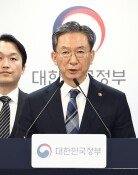[Editorial] Some suspicions over additional public funding
[Editorial] Some suspicions over additional public funding
Posted September. 22, 2000 21:44,
After a long, protracted debate, the Kim administration has finally made a decision to raise the additional public fund of 40 trillion won. This additional funding, we admit, appears inevitable to complete our economic priority agenda, which is an early accomplishment of financial reforms in order to stabilize the nation's unsettling capital market. We would, however, like to point out here several points which are not readily understandable.
First, when the government asked for 64 trillion won for financial reforms at first, it assured the nation that the amount will be sufficient and that there will be no more need to raise the public fund. The government, therefore, owes an explanation as to what prompted the change to require now such a huge amount of additional funding. Has it anything to do with its erroneous judgment in its decision-making at first time, or has any misappropriations of the fund made additional funding necessary now? No clear explanations are given so far by the officials, nor do they mention anything about the accountability over the matter.
Second, when the 64 trillion won it raised were all exhausted, the prevailing public opinion advised the government that additional funding was needed to stabilize the capital market, but the government prior to the April 13 parliamentary elections countered such public opinion by saying that the Korea Deposit Insurance Corporation¡¯s loans will be sufficient to meet the need.
The point is that all we needed for the public fund at that time amounted to only 20 trillion won but we will have to raise 40 trillion won now. We would, therefore, like to ask whether the pre-election partisan calculations were responsible for the incurring of the public fund's subsequent increase, which will ultimately be translated into the people's burden.
Third, there are banks which went bankrupt despite the government's input of enormous amount of rescue funds. We should like to ask how far the government held those banks responsible for their failures as well as for the moral hazard of those firms in workout process under those banks' supervision. If the government did not take any measures to ask their responsibilities, what was the reason behind the government's such inaction?
If so, is this a reflection of the government's irresponsible attitude to regard that there are no specific, individual owners or claimants for the public funds as to cause big problem to them for the losses? The truly lamentable state of affairs, we must point out here, is that the government spent some 6.5 trillion won for Hanvit Bank as its rescue fund, but the Bank became now the subject of seismic controversy for its unlawful loan of 100 billion won, instead of becoming an restructured, clean bank!
In view of such failures, the general public surely has the right to ask for the proper mechanism or measures of rigorous scrutiny, worthy of the public's support, for any additional raising of the public funds. The government's plan is to have the public funds jointly managed by both the government officials and civilians, but the fund's managing people as well as the National Assembly must be empowered with full powers to audit the funds' use and operations.
At the same time, it should be made clear that the amount of the public fund and the exact purpose for its use should be made transparent and exact as well as being specific and concrete. There should also be assurance that this will be the final and last occasion to ask the people for the public fund.
What worries us in addition is the fact that the Daewoo case, it looks now, will require an enormous amount of additional funds, but the government's additional request for public fund does not take such considerations into account, which raises its credibility into question.
Raising of any public funds entails enormous pains and burden for the people. Thus, we must make sure that the effect of its use must be maximized. All those involved in the executions of the public funds, be they restructuring financial institutions or corporations, or the government's supervisory agencies and departments in charge of the public funding must display a renewed determination in ensuring just and transparent use of the public funds. The general public will certainly keep in mind the assurance of Finance and Economy Minister Jin Nyum that he will be prepared to face the Assembly hearings, should anything goes wrong.







